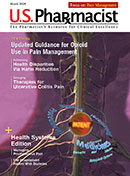Investigators analyzed data for 2010 to 2016 from the NCDB—a large database managed by the American College of Surgeons—for patients aged 18 years or older who were diagnosed with stage I-III BC and who had received systemic adjuvant chemotherapy (AC) after BC surgery. Patients who received neoadjuvant chemotherapy were excluded.
Patients were divided into five groups based on the time of AC initiation following surgery: <30 days, 31 to 60 days, 61 to 90 days, 91 to 20 days, and >120 days. Patients were further analyzed based on receptor type: triple-negative (TNBC), hormone receptor—positive/HER2-positive (HR+/HER2+) BC, hormone receptor—positive/HER2-negative (HR+/HER2-) BC, hormone receptor—positive/HER2-positive (HR+/HER2+) BC, and hormone receptor—negative/HER2-positive (HR-/HER2-) BC.
A delay in AC therapy was defined as receiving AC >60 days from the date of BC surgery.
Data were available for 332,927 study patients. After adjustments for BC receptor subtype, sex, age, type of facility in which treatment was received, median income, insurance status, metro/urban area, race, disease stage, and Charlson Deyo score (an index that predicts long-term survival), investigators found that older age, non-Caucasian race, being treated at an academic/research facility, being uninsured or having government insurance, having stage I (vs. stage II) disease, and having higher Charlson Deyo scores were associated with AC treatment delays. Having HR+/HER2- BC was associated with the greatest likelihood of not receiving treatment in a timely manner, followed by HR+/HER2+ and HR-/HER2+ BC; TNBC was the least likely to have a delay in treatment.
Upon assessment at 90 months, the best survival estimates based on Kaplan-Meier (KM) scores in the overall BC population occurred in the group that received AC within 31 to 60 days of surgery, followed by 61 to 90 days, <30 days, 91 to 120 days, and lastly, >120 days and were 81.2%, 79.5%, 79.2%, 77.7%, and 74.4%, respectively. The trend in best KM survival estimates at 31 to 60 days was also seen in patients with TNBC and HR+/HER2- BC, which were 77.0% and 82.0%, respectively. Best KM survival estimates for patients with HR+/HER2+ and HR-/HER2+ BC, which were 87.3% and 82.8%, respectively, occurred when AC was administered <30 days after surgery.
The adjusted hazard ratio for survival between the groups found that for the overall population as well as patients with HR+/HER2+ BC, HR-/HER2+ BC, and TNBC, the 31- to 60-day time frame was the ideal time to start AC; for HR+/HER2- BC, this window increased to 31 to 90 days.
The authors concluded that delays in initiation of AC therapy following BC surgery may lead to poor outcomes, especially in patients with TNBC.
This paper provides useful information for pharmacists who frequently encounter BC patients whose AC treatment may be delayed because of the COVID-19 pandemic.
The content contained in this article is for informational purposes only. The content is not intended to be a substitute for professional advice. Reliance on any information provided in this article is solely at your own risk.






